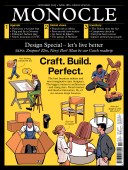
Issue 168
Are you sitting comfortably? Monocle’s autumn design bonanza profiles the best new chairs, tables and accessories available this season, interviews architectural luminaries including Renzo Piano and hits the road in Czechia to meet the makers forging a new gold standard in craft. We also assess France’s waning influence in Africa and unlock the secrets of the world’s safest safes.
In This Issue
Oops! No content was found.
Looks like we no longer have content for the page you're on. Perhaps try a search?
Return Home

